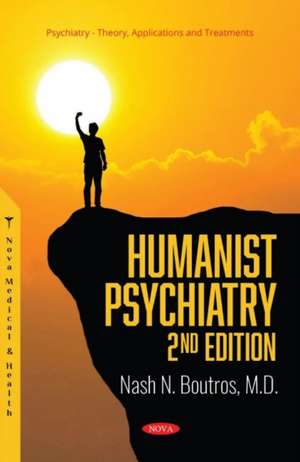Humanist Psychiatry
Autor Nash N. Boutros M.D.en Limba Engleză Paperback – 5 apr 2022
Preț: 558.90 lei
Preț vechi: 648.87 lei
-14% Nou
106.95€ • 111.94$ • 89.01£
Carte disponibilă
Livrare economică 10-24 martie
Specificații
ISBN-10: 1685075010
Pagini: 163
Dimensiuni: 155 x 230 x 14 mm
Greutate: 0.26 kg
Editura: Nova Science Publishers Inc
Colecția Nova Science Publishers Inc
Cuprins
Preface; Acknowledgments; Introduction to the Second Edition; Humanism Principles Relevant to Psychiatric Care; The Biology Principle; What is in a Name?; A Humanist Model for the Practice of Psychiatry: A Proposal to Facilitate Assimilation of New Knowledge; A Proposed New System of Integrated Psychiatric Care with Prevention, Primary Care, General Psychiatry Practice, Specialization and Sub-Specialization: From Pre-Conception to Terminal Care; Should Psychiatry be a Separate School from Medicine?; Psychiatric Education; Research in Psychiatry; Personality Disorders; Drug and Alcohol Use Disorders; Correctional Psychiatry; Developmental Intellectual Disabilities: Formerly Mental Retardation; Stigma; Afterthoughts; About the Author; Index.
Descriere
Humanism is an optimistic philosophy that believes in the scientific process, human worth and dignity, and the ability of humankind to solve its problems no matter how complicated. "Humanist Psychiatry, 2nd Edition" is not about the practice of psychiatry, but rather about how the field is conceptualized, organized, and propelled forward. Despite the huge advances in the neurosciences in the last 30 to 40 years, the practice of psychiatry has remained stagnant except for a few newer and safer medications. This book is an outcry for all who care about human suffering in any form but particularly in the form of psychiatric disorders. The principle of worth and dignity does not place a price, nor take into consideration, the cost of taking care of human beings. Psychiatric disorders remain devastatingly widespread, under-recognized and under-treated worldwide. Psychiatric disorders are among the most common causes for disability and lost productivity. Psychiatric patients have lives that are 15 to 20 years shorter than mentally healthy populations. Advances in neuroscience research clearly and overwhelmingly point to the eventual unraveling of the mysteries of the brain. We, in psychiatry, cannot wait the decades it will take to fully understand the brain. The term "mental" embodies the duality of mind-brain or mental-physical. Doing away with this duality is our first step to burying stigma and relegating it to medical history. "Humanist Psychiatry" begins by summarizing the humanist principles, then discusses how the biology principle should guide advances in psychiatric research and how psychiatry research could be organized. The book addresses issues of education and practice from a humanist's viewpoint. The book then goes into more specific areas of practice, like correctional and addiction psychiatry, discussing how practice adhering to the humanist principles would impact the field. The current edition of Humanist Psychiatry deals with controversial issues like drug legalization and whether psychiatry should have its own school instead of being a branch of medicine. Finally, the book discusses the issue of stigma and how humanism can help speed up the dissipation of the stigma associated with psychiatric disorders. The 2nd edition of Humanist Psychiatry has widened its scope to address all professionals working in the field, such as social workers, psychologists and addiction therapists in addition to all those who care about the issue of psychiatric disorders from community organizers to legislators.
